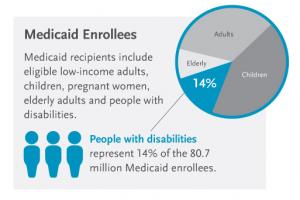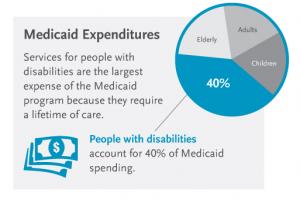

For many people with intellectual and developmental disabilities, Medicaid becomes the primary funder of their care at some point in their life. Sometimes this happens when they are transitioning out of high school, other times it happens when a parent or other guardian is no longer able to provide the bulk of their care.
Part of caring for our neighbors with intellectual and developmental disabilities includes making sure all of their needs are met—not just their spiritual needs.
To help you understand how service providers are funded, we’ve answered a few commonly asked questions about Medicaid.
What is Medicaid?
Medicaid is a publicly funded and administered health insurance program. It provides coverage for people with disabilities, the elderly, low income adults and children.
How is Medicaid different than Medicare or private health insurance?
Medicare and private health insurance typically only cover acute health care— Medicaid covers both acute health care and long-term care. Medicaid is only offered to people who demonstrate financial need and/or qualify for other reasons, such as having a disability.
Acute health care and long-term care? What’s the difference?
Acute health care typically treats conditions like pneumonia, influenza or broken bones through medical care. Treatments focus on the short term: curing diseases, healing from accidents and preventing future illness or injuries. Other than major health events like cancer, costs are usually fairly low.
Long-term care focuses on supporting and improving the lives of people who have long-term, continual needs that cannot be cured. Treatments range from help with daily tasks like cleaning, bathing, meal prep and feeding to speech therapy, mental and behavioral health. Because these needs are life-long and require continuous care, costs are much higher.
How does Medicaid help people with intellectual and developmental disabilities (I/DD)?
For most people, long-term care is too expensive for an individual or a family to afford, even with full-time employment.
Medicaid spending seems to be really high, why is that?
Medicaid spending has grown in the last 15-20 years because more people need and qualify for Medicaid-funded services. As baby-boomers age, more are receiving Medicaid. Additionally, more people with I/ DD will need increased Medicaid funding because their parents can no longer care for them at home, because more than 25 percent of people with I/DD live at home with an aging caregiver.
Isn’t there a way to control costs better?
Medicaid is the most cost-effective health care program in the United States. Despite its efficiencies, there are still many more people who qualify for Medicaid who aren’t receiving benefits. In the U.S., more than 428,000 people with I/DD are on waiting lists to receive care in a community setting. Community care settings (group homes, in-home support and host homes) usually cost much less than state institutional settings, but states are not required to offer community-based care to people who qualify for it.
Visit www.mosaicalliedvoices.org to learn more about Mosaic’s advocacy program.



